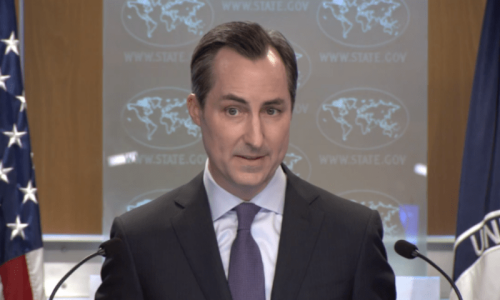IN October 2023, when the Supreme Court struck down the military trials of civilians, the detailed judgement began with the following quote: “even amid the clash of arms, the laws were not silent, that they spoke the same language in peace and in war”.
The majority judgements were authored by Justices Munib Akhtar and Ayesha Malik. Even in the darkest of times, the court affirmed, fundamental rights must remain in every part of our territory. On May 7, the Constitutional Bench overturned this decision, and sanctioned the military trials of civilians. The verdict is a surrender of fundamental rights, and a defeat for the Constitution. A law first introduced by Ayub Khan in 1967 has been restored. This means civilians can be court-martialled going forward.
The law allowing the court martial of civilians was part of a series of oppressive Ayub-era laws. Under the Defence of Pakistan Ordinance, 1965, and the rules made thereunder, citizens could be preventatively detained on vague grounds including “suspicion” that a person was likely to act in a manner prejudicial to “peaceful conditions”.
In the ‘Malik Ghulam Jilani’ case, Justice Cornelius held that there must be a ground stronger than mere suspicion, an objective satisfaction test would be applied, and preventative action was for exceptional cases.
In his diaries, Ayub wrote “the DPR has been destroyed by the Supreme Court on [the] behest of Cornelius”, and elsewhere would go on to call Cornelius a “fraud”. In Ayub’s words, there was a clear contempt for independent civilian judges and the civilian justice system as a whole.
Courts have a duty to strike down laws incompatible with rights.
The people of Pakistan continue to be subjected to laws that are creatures of dictatorships. By allowing the court martial of civilians, civilian judges have revived an Ayub-era law that was introduced at a time when there was a proclamation of emergency. The highest court of the land has displayed a complete lack of faith in the civilian justice system.
Post-18th Amendment, by virtue of Article 10-A, the right to a fair trial and due process is enshrined as a constitutionally secured fundamental right. “By way of Article 10A of the Constitution, the right to fair trial has been raised to a higher pedestal,” held Justice Malik.
In her detailed judgement declaring military trials for civilians unconstitutional, she explained how military courts do not comply with fair trial and due process standards: members of the executive act as judges, there is no reasoned judgement, trials take place behind closed doors, and even the right to prepare a defence can be suspended on grounds of military exigencies.
In overturning this decision, the Constitutional Bench found that the right to a fair trial is “fully protected” under the Army Act. At the same time, it held that the matter is referred to parliament for “considering and making” a law granting an independent right to appeal to the high court for civilians convicted by military courts.
This finding is contradictory. If the right to a fair trial is secured under the Army Act, why is an independent right to appeal required? This is a concession by the Bench that the law, as it stands, is incompatible with fair trial standards.
In the original decision, Justice Akhtar held that the very “offer” by the government of certain additional rights to civilians made clear that fundamental rights are transitory and not guaranteed in military courts.
Similarly, Justice Malik held that: “The attorney general for Pakistan again sought time to seek instructions of whether the right of appeal could be given before an independent forum. These assurances and statements by the AGP in themselves reflect the fact that the concept of fair trial and due process being a fundamental right is not inherent in the proceedings for the benefit of civilians before a military court.”
It is not for the government to “offer” fundamental rights to citizens. If these are dependent on the government offering and denying them at whim, they lose all meaning. Courts have a duty to strike down laws incompatible with fundamental rights; not to make referrals to parliament.
Post-26th Amendment, the judiciary faces a credibility crisis. Judges who are nominated by government members to the Constitutional Bench are judging the lawfulness of the government’s actions. The AG is on the Judicial Commission that nominates judges to the Constitutional Bench, and the AG appears before the same bench to defend the government’s actions.
Meanwhile, the challenges to the 26th Amendment are yet to be determined.
In 2023, our Supreme Court spoke for fundamental rights and the Constitution. The Constitutional Bench did not stand by the brave decision of their colleagues. Ultimately, history will judge the judges that endorsed the militarisation of justice.
The writer is a barrister.
X: @RidaHosain
Published in Dawn, May 25th, 2025
















































